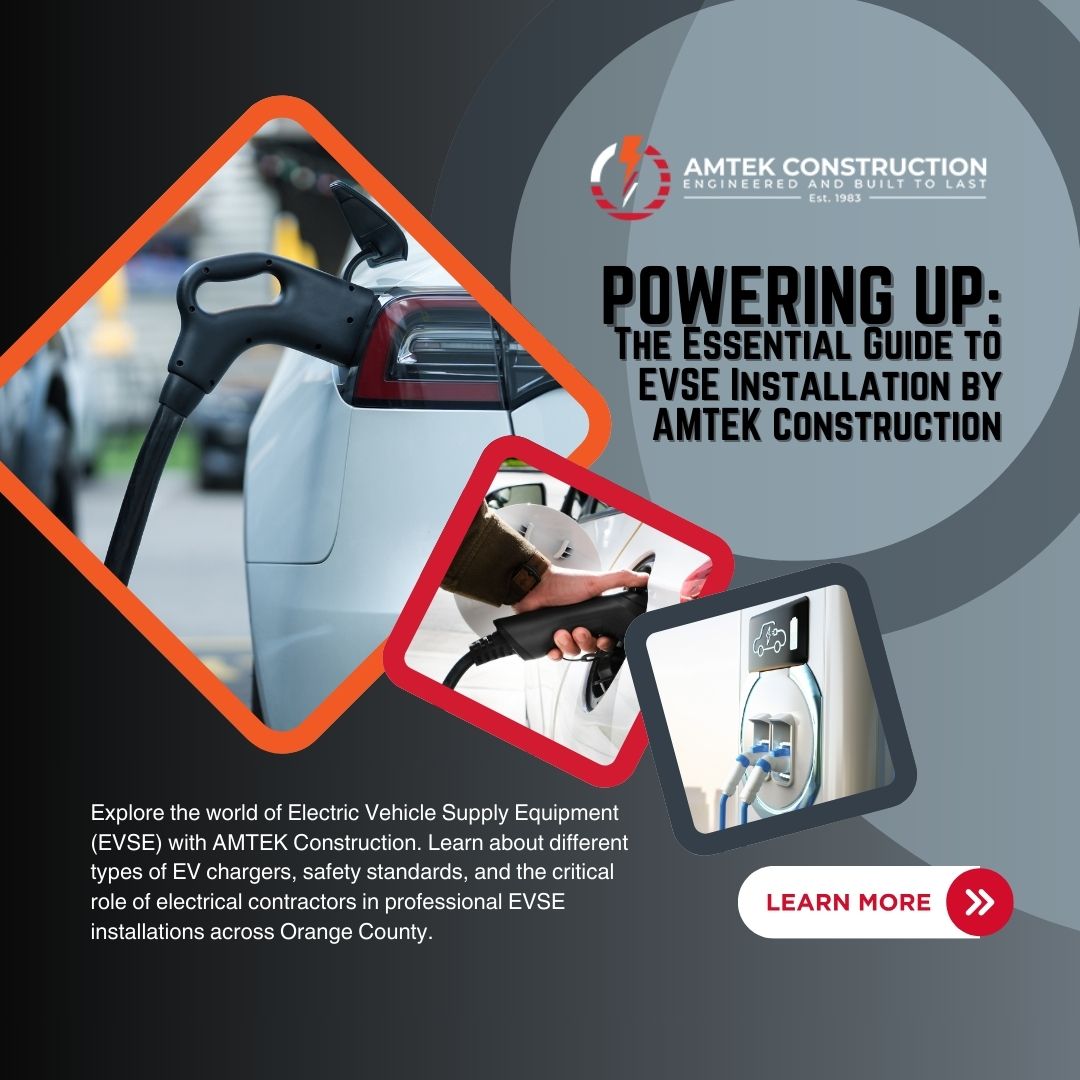As the adoption of electric vehicles (EVs) accelerates, the demand for robust charging infrastructure is more critical than ever. AMTEK Construction, a leader among electrical contractors in Orange County, is at the forefront of deploying Electric Vehicle Supply Equipment (EVSE) to meet this growing need. EVSE encompasses all the components required to recharge EVs, including electrical connectors, wiring, and the necessary equipment for safe charging.
Exploring the Key Aspects of EVSE
1. Types of EVSE:
- Level 1 Chargers: Utilize a standard 120-volt household outlet, typically used for overnight charging, offering about 4-5 miles of range per hour.
- Level 2 Chargers: Operate on 240 volts (similar to what an oven or dryer uses) and can charge a vehicle much faster, typically providing about 12-80 miles of range per hour. These are prevalent in both residential and commercial settings.
- DC Fast Chargers: Use direct current (DC) instead of alternating current (AC) and are the fastest type of EV chargers available, capable of delivering 60-80 miles of range in just 20 minutes. These are commonly found in public charging stations along highways or in commercial areas where quick charging is essential.
2. Safety Standards and Certifications:
EVSE must adhere to various safety standards and regulations to ensure safe and effective operation. In the U.S., the installation of EVSE is governed by the National Electrical Code (NEC) Article 625. Additionally, units often require certification from recognized testing organizations like Underwriters Laboratories (UL) or the International Electrotechnical Commission (IEC).
3. Smart Charging Features:
Modern EVSE options often include advanced features such as programmable timers, Wi-Fi connectivity, and smartphone integration. These functionalities allow users to remotely monitor and control charging, optimize charging times based on energy rates, and access detailed usage data.
4. Accessibility and Payment Systems:
Public and commercial EVSE typically include user-friendly features such as easy payment systems and accessibility for individuals with disabilities. They may also be integrated into networks that provide users access to multiple charging stations through a single membership or app.
The Role of Electrical Contractors in EVSE Installation
Electrical contractors like AMTEK Construction play a crucial role in the safe and effective installation of EVSE, whether for private homes, commercial buildings, or public spaces. Proper installation ensures that the EVSE operates reliably and complies with all local electrical codes and standards. Services provided by AMTEK Construction include:
- Site Assessment: Determining the most suitable locations for EVSE based on power availability and accessibility.
- Upgrading Electrical Systems: Modifying existing electrical infrastructure to accommodate the additional load from EVSE, which may involve upgrading panels or installing new circuits.
- Installation Services: Executing the physical installation of the EVSE, including mounting the units, making all necessary electrical connections, and configuring network connections for smart chargers.
- Testing and Commissioning: Ensuring that the installed EVSE functions correctly and safely before being put into regular use.
- Maintenance Services: Offering ongoing maintenance and support to resolve any issues and ensure the charging station remains in optimal working order.
Conclusion
With the growth in electric vehicle ownership, the demand for skilled electrical contractors like AMTEK Construction to install and maintain EVSE is rising. Businesses and public entities in Orange County looking to support this green initiative can rely on AMTEK Construction for professional and compliant EVSE installation, ensuring that their facilities are well-equipped to meet the needs of the present and future EV owners.

